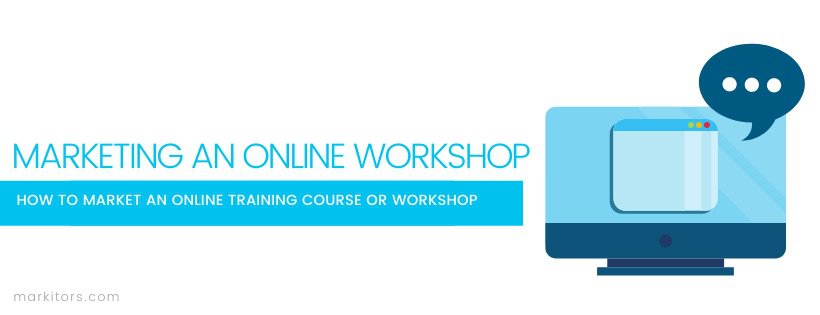
The popularity of online courses and training workshops has exploded over the past decade. Since 2000, the eLearning industry has grown by 900%. Life coaches, HR execs, consultants, and ‘gurus’ of all sorts now have a platform to share their knowledge and help people better themselves.
Of course, that means there is serious competition for audiences. Standing out from the crowd can be a challenge, but thankfully there are plenty of marketing options to help your online courses or lectures sell out.
From top social media tips to SEO, follow along as we go through the 6 best digital ideas for how to market an online course or workshops.
1. Use social media to help build brand reputation
Everyone knows the power of social media in our interconnected world, but creating a presence that draws in the right audience can be a challenge—especially if you don’t know what to post.
We have three main recommendations for what to post on your social media to market your online course.
- Content from your blog. Posting content from your blog helps to not only educate your followers but also to connect them with your online course. Below you can see noted leadership expert John C. Maxwell doing this with a Facebook post.

- Informative articles from authoritative sites. Posting articles from prominent, authoritative, and relevant sites is an ideal way to draw in new followers. Here’s an example from Coursera, one of the biggest online learning companies, where they post a Harvard Business Review article.
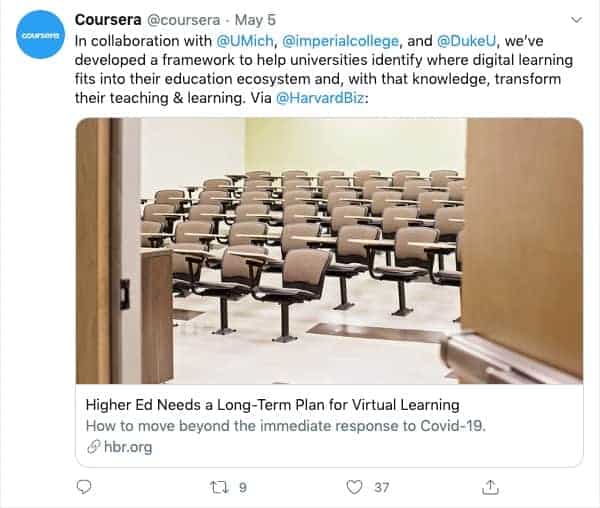
- Infographics and Videos. Infographics and videos are the perfect social media content. As long as they contain valuable content that naturally segues into your product, you are sure to get marketing value. These can be teasers of an upcoming webinar, snippets from a course, or informative videos about a related topic to engage your audience. For example, here’s ecornell.edu sharing a video from their Youtube channel on their Twitter.
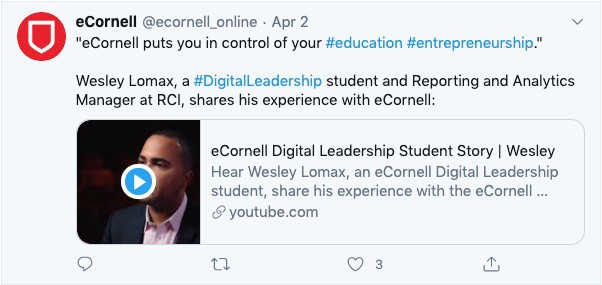
Hashtag Research
If you still are having trouble gaining followers on social media, try improving your hashtag research. It’s one of the best ways to find topics to post about, and hashtags allow your posts to reach a wider audience.
Some common training hashtags include:
2. Leverage your connections to start an email marketing campaign
If you’ve created a training course or workshop, it’s probably because you have a wealth of experience you want to share with the world. You’re leveraging skills and knowledge you’ve developed throughout a long career to create a new business—why not leverage all the connections you’ve made too?
Leveraging industry connections with an email marketing campaign can help build your business without breaking the bank.
In fact, you’ll be making money. A study from Campaign Monitor found that email marketing produces $44 for every $1 spent.
So if you have the contacts built up, email marketing is a solid marketing tool in terms of ROI. It also has a low cost to entry and will allow your business to take advantage of the assets you already have—connections.
Of course, you may need help learning how to market your online course with top email marketing strategies. If that’s the case, we recommend the HubSpot training courses on email marketing to get acquainted with the basics.
3. Create a blog and videos for your website to draw in organic web traffic
Content marketing is one of the best ways to draw in organic web traffic and build your brand online.
What is content marketing?
It’s a common tactic of search engine optimization (SEO) that involves creating quality, informative content like blogs and videos based on industry research, competitor analysis, and keyword research.
What’s SEO?
SEO is the process of increasing a website’s visibility on search engines like Google and Bing. It works to move your website up search engine results pages. That’s incredibly important because, as you can see from the chart below, there is an extreme dropoff in search traffic after page one of Google results (positions 1-10).
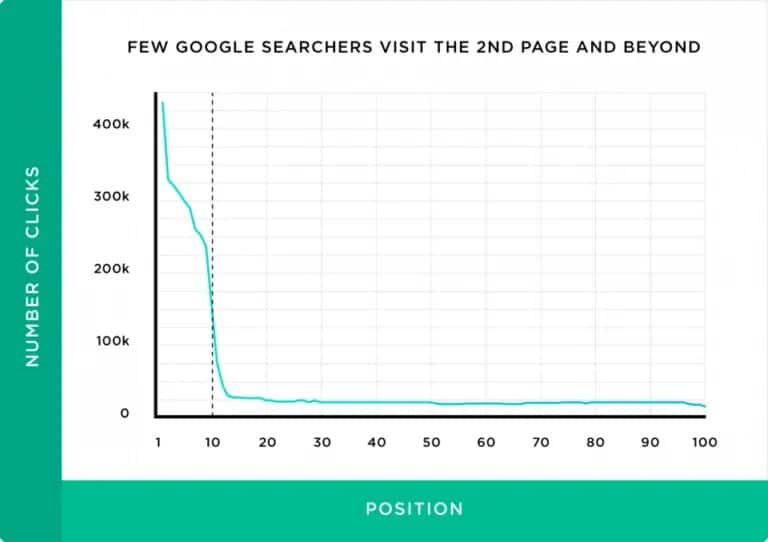
Content marketing is just one of the many ways SEO helps to move your site to the first page of results for relevant queries.
A blog is the most accessible content marketing tool to produce, but if you can add video, it’s even better for SEO and your brand authority.
According to a Hubspot survey, more than half of all consumers want to see more video content.
And, on top of that, companies who blog get 97% more links to their websites. Links are extremely valuable in improving domain authority, which is a key factor in Google’s search rankings.
Industry leaders are flocking to content marketing. Just look at John Maxwell, one of the most well-known leadership ‘gurus’ and #1 New York Times Bestselling author.
Maxwell was recently featured in Forbes to discuss his leadership advice. He offers training courses online and, of course, has an extensive blog.

4. Publish articles with your insights on as many publications as possible
More online course enrollments and workshop participants come as a direct result of increased traffic on your website.
Publishing articles with quality insights is another great SEO tactic to help do just that. SEO will move your site up search engine results pages, increasing organic website traffic—and that means more course enrollments.
By publishing articles on authoritative websites, you can improve your site’s backlink profile, one of the key factors in determining search engine rankings.
On top of that, publishing articles on industry publications, blogs, local newspapers, and more positions you as an industry expert which can help improve your brand awareness.
How do you get published? It’s all about creating partnerships with publications to provide them quality content in exchange for the exposure and, at times, a backlink.
Even Tony Robbins, who has sold millions of dollars worth of training courses, understands the value of publishing articles on authoritative sites that link back to his own.
Here’s an example from Inc.com that provides Robbins with exposure, and that valuable link back to his website to improve its domain rating:
 Remember, these articles aren’t sales pieces. They are meant to inform and engage the audience, not sell your products or services. The value in publishing quality content on authoritative sites comes from the exposure and sometimes a backlink, not from a sales pitch.
Remember, these articles aren’t sales pieces. They are meant to inform and engage the audience, not sell your products or services. The value in publishing quality content on authoritative sites comes from the exposure and sometimes a backlink, not from a sales pitch.
6. Start a YouTube channel for a multifaceted approach to training
How do you market your online course or workshop to a new audience? YouTube has grown into the perfect platform to share ideas and reach a larger audience with training courses and workshops.
In fact, YouTube is the most widely used video-sharing platform in the country. As of the end of 2019, an amazing 73% of American adults used YouTube’s platform, eclipsing Facebook’s 69%, according to data from the Pew Research Center.
Creating a YouTube channel isn’t easy. You’ll need to produce high-quality videos, get familiar with YouTube SEO, and market them like you would any other product if you want them to find an audience at first. However, once you start building your audience, the benefits can be incredible.
For example, Jack Canfield, a bestselling author and personal development coach, has been able to rack up over 145,000 subscribers on Youtube.
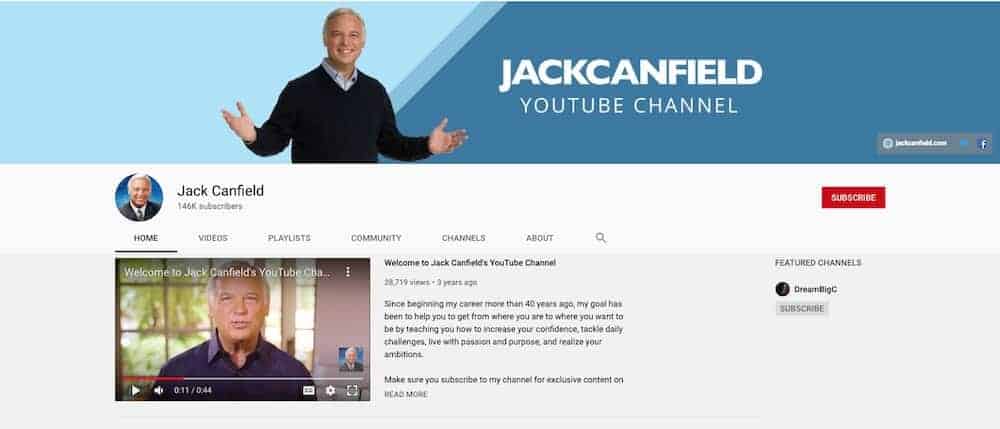 Canfield has a multifaceted approach to training with online downloadable PDFs, video lectures, in-person workshops, and more. All of these assets are designed to deliver his message of personal development to as large an audience as possible in whatever medium they feel most comfortable with.
Canfield has a multifaceted approach to training with online downloadable PDFs, video lectures, in-person workshops, and more. All of these assets are designed to deliver his message of personal development to as large an audience as possible in whatever medium they feel most comfortable with.
Not only is his channel the perfect way for potential clients to hear his insights, but it’s also a great marketing tactic. It helps lead visitors right to Canfield’s website so they can buy his training courses, and, on top of that, it makes money through Google Adsense! Now that’s a win-win-win.
Of course, not every Youtube channel is going to find this level of success, but establishing a presence on the platform is well worth the effort.
After all, a whopping 78.8% of marketers say YouTube is the most effective video marketing platform. So if you want to increase your brand awareness and improve your client’s training experience—try Youtube.
Too much marketing, too little time?
If all of this is starting to sound a little overwhelming, don’t worry. You can always reach out to the experts.
We’d be more than happy to help you get started on learning how to market your online training courses or workshops to help you stand out from the crowd in a competitive industry. Feel free to contact us to learn more.
Markitors is an internet marketing agency with a focus on SEO. We help small businesses rank higher on Google to draw more leads to websites and increase revenue. Explore what’s in our SEO toolbox: audits and keyword research, digital PR, technical SEO, and local SEO.








